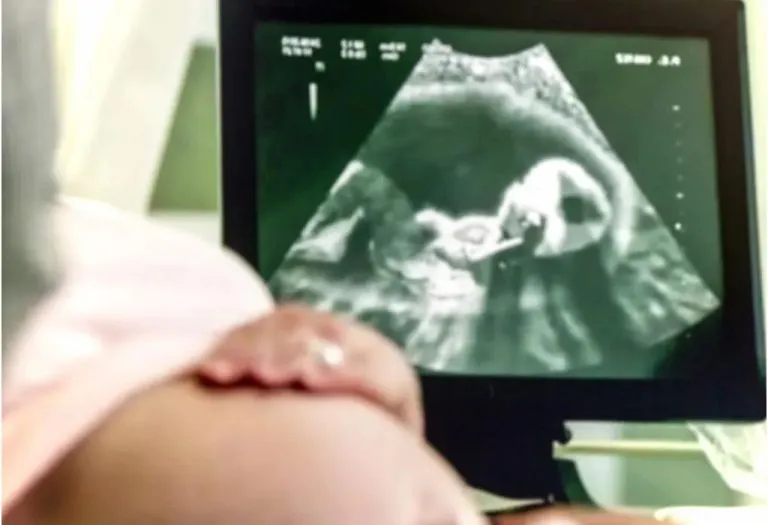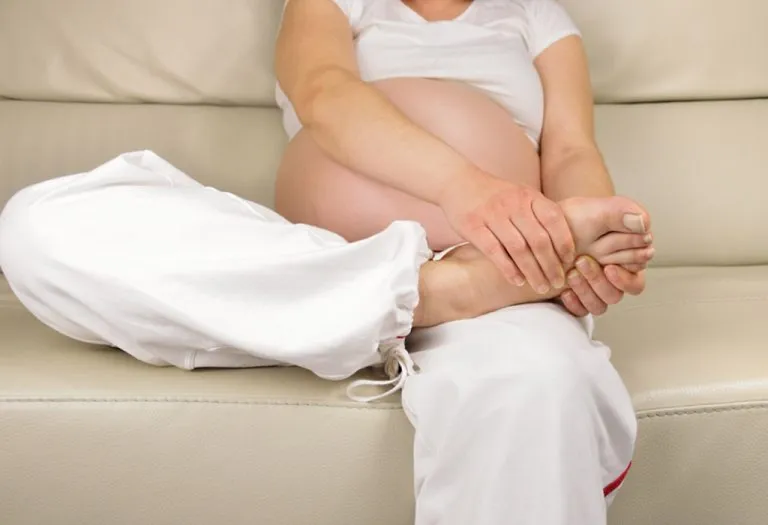Unborn Baby Kidney Problems in Pregnancy: Causes, Symptoms & Treatment

- What Is Fetal Kidney Problem?
- What Are the Different Types of Kidney Problems in an Unborn Baby?
- Causes of Fetus Kidney Problems
- How Are Fetal Kidney Problems Detected During Pregnancy?
- Effects of Kidney Problems
- Treatment for Fetal Kidney Problems
- FAQs
Kidneys help regulate the level of the electrolytes in the body, aid in expelling toxins by producing urine, maintain blood pressure, help make red blood cells, and maintain the levels of various minerals. Kidneys start developing at a much earlier stage in your baby’s life (first month). Sometimes, your unborn baby’s kidneys could have problems, which may cause other complications after birth. However, with timely medical intervention and monitoring, various associated risks which may occur at birth can be reduced. Read on to learn about baby’s kidney problems in pregnancy and how to treat them.
What Is Fetal Kidney Problem?
Sometimes, your baby’s kidneys may not develop fully, which can cause hindrances in their proper functioning. You may feel guilty and think that you have done that led to a problem with your unborn baby’s kidneys. However, most kidney problems result due to genetic glitches. The silver lining is that these problems get diagnosed during prenatal check-ups, and the necessary steps can be taken at the right time. Foetal kidney problems can be treated medically or surgically, depending on the severity of the ailment. There are some problems, such as hypertension, growth issues or UTI (urinary tract infection), that a child may develop at a later stage.
What Are the Different Types of Kidney Problems in an Unborn Baby?
Kidney problems in unborn babies can be of various types. In this section, we will help you understand the kidney ailments by their types:
1. Hydronephrosis
This condition is characterised by the swelling in the unborn baby’s kidneys. The swelling of the kidneys may cause the funnel-like part of the kidneys to dilate. The dilation may happen in one or both kidneys. Also, the dilation may occur with or without any obstruction. Some of the common blocks are Neurogenic bladder, Ureterocele, Ureterovesical junction obstruction (UVJ), Ureteropelvic junction obstruction (UPJ), and Posterior urethral valves (3).
2. Polycystic Kidney Disease
Sometimes, cysts may begin to appear in your baby’s kidneys. When these cysts start growing, they may damage the kidney tissue. This kidney ailment usually occurs due to genetic mutation issues (2).
3. Fetal Multicystic Dysplastic Kidney
Sometimes, a grape or a bunch of grapes-like structures may begin growing inside your unborn baby’s kidneys. This kind of deformity of the kidneys occurs during the development of the fetal kidneys (6).
Causes of Fetus Kidney Problems
There are few substantial studies available that explain the causes of fetal kidney disorders. Also, the occurrence of kidney problems in unborn babies is a rare phenomenon (9). However, the following are certain assumptions regarding the causes:
- When the blockage occurs, the urine goes back to the kidneys. This causes hydronephrosis.
- Polycystic kidney diseases may occur due to a genetic mutation.
- When the kidneys do not form properly in an unborn baby, it leads to the fetal multicystic dysplastic kidney.
How Are Fetal Kidney Problems Detected During Pregnancy?
Here are some parameters that your doctor may use to identify if your unborn baby suffers from any kidney-related ailments:
- Any deformities or abnormalities in your unborn baby’s kidneys can be detected during your routine prenatal ultrasound. Around the 20th week of pregnancy, your doctor might be able to determine if there is any kidney-related problem in your baby.
- By taking out a sample of your amniotic fluid (amniocentesis), your doctor might be able to diagnose polycystic kidney disease. Similarly, tissue from the placenta might be tested (chorionic villus sampling) to detect genetic defects (5).
- Foetal multicystic dysplastic can be detected during an ultrasound exam (7).
Effects of Kidney Problems
The effects of various kidney problems depend on their type and severity. The foetal multicystic dysplastic kidney disorder may cause blockage in the kidneys and other complications. Hydronephrosis may lead to pain between the ribs and the hips. PKD, or polycystic kidney disease, may lead to fatal complications such as kidney failure (8). PKD may also cause cysts in other body parts, such as the brain, pancreas, ovaries, liver, intestines, and spleen. The complications associated with PKD may be mild or severe.
Treatment for Fetal Kidney Problems
Unfortunately, there is no treatment available for PKD or polycystic kidney disease and multicystic dysplastic kidney disease. However, your doctor may recommend some of the following treatments in case foetal kidney development problems are detected:
1. In Case of Polycystic Kidney Disease
If PKD leads to hypertension, your doctor may prescribe medication to control the blood pressure. If a UTI or urinary tract infection occurs, your doctor may prescribe antibiotics to suppress the infection. However, if more severe complications arise, it may cause kidney failure, and your doctor may recommend dialysis or a kidney transplant (4).
2. In Case of Multicystic Dysplastic Kidney Disease
Your doctor will closely monitor this condition through your prenatal ultrasounds.
3. In the Case of Hydronephrosis
If this condition occurs, your doctor may try to clear the blockage or obstruction that may cause the urine to return to the kidneys (1).
It is rare for unborn babies to suffer from kidney ailments. However, if your doctor detects a problem with your baby, you should ask about the complexity of the problem. Once you know the severity of the condition, you can discuss various treatment options in detail with your doctor. With proper medical care and treatment options, you can help your baby feel better.
FAQs
1. Can unborn baby kidney problems be prevented during pregnancy?
While not all cases of unborn baby kidney problems can be prevented, maintaining good prenatal health, avoiding harmful substances, and seeking early prenatal care can help reduce the risk. Genetic counselling may also be beneficial for families with a history of kidney problems or genetic conditions.
2. What role does prenatal care play in managing unborn baby kidney problems?
Prenatal care is crucial for the early detection and management of unborn baby kidney problems. Regular prenatal check-ups, including ultrasound examinations, allow healthcare providers to monitor fetal development, detect abnormalities early on, and provide appropriate interventions or treatments.
We hope this post has helped you understand the various fetal kidney issues that an unborn baby could have. If you have concerns, visit your doctor right away.
References/Resources:
1. Kidney Diseases in Childhood; Nemours KidsHealth; https://kidshealth.org/en/parents/kidney-diseases-childhood.html
2. Kidney Cysts in Infants, Children & Teens; American Academy of Pediatrics; https://www.healthychildren.org/English/health-issues/conditions/genitourinary-tract/Pages/Kidney-Cysts-in-Infants-Children-Teens.aspx
3. Hydronephrosis in Newborns; National Institute of Diabetes and Digestive and Kidney Diseases; https://www.niddk.nih.gov/health-information/urologic-diseases/hydronephrosis-newborns#
4. Autosomal Recessive Polycystic Kidney Disease; National Institute of Diabetes and Digestive and Kidney Diseases; https://www.niddk.nih.gov/health-information/kidney-disease/polycystic-kidney-disease/autosomal-recessive-pkd#
5. Fetal Polycystic Kidneys; International Society of Ultrasound in Obstetrics and Gynecology; https://www.isuog.org/clinical-resources/patient-information-series/patient-information-pregnancy-conditions/renal-system/fetal-polycystic-kidneys.html
6. Multicystic Dysplastic Kidney; Children’s Hospital of Philadelphia; https://www.chop.edu/conditions-diseases/multicystic-dysplastic-kidney#
7. Multicystic Dysplastic Kidney; National Institute of Diabetes and Digestive and Kidney Diseases; https://www.niddk.nih.gov/health-information/kidney-disease/children/multicystic-dysplastic-kidney
8. Polycystic Kidney Disease; National Kidney Foundation; https://www.kidney.org/atoz/content/polycystic
9. Detecting Kidney and Urinary Tract Abnormalities Before Birth; National Kidney Foundation; https://www.kidney.org/atoz/content/detectkid
Also Read:
Kidney Stones during Pregnancy
Epithelial Cells in Urine when Pregnant
Kidney Infection (Pyelonephritis) in Pregnancy
Was This Article Helpful?
Parenting is a huge responsibility, for you as a caregiver, but also for us as a parenting content platform. We understand that and take our responsibility of creating credible content seriously. FirstCry Parenting articles are written and published only after extensive research using factually sound references to deliver quality content that is accurate, validated by experts, and completely reliable. To understand how we go about creating content that is credible, read our editorial policy here.




































